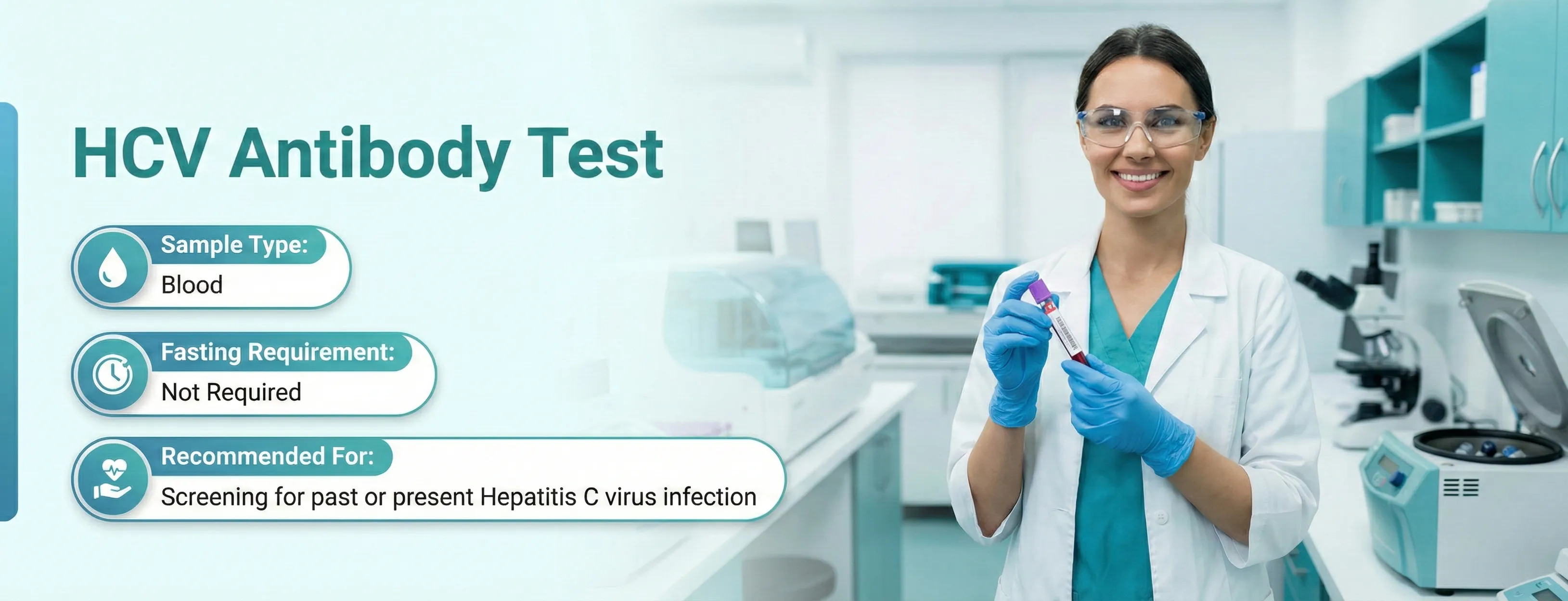407+ orders placed in your location
100% NABL & ISO Certified Lab • 100% Accurate Reports
HCV Antibody Test
Anti-HCV Test, Antibody to HCV
- SummaryThe HCV Antibody Test helps detect past or current Hepatitis C Virus (HCV) infection by identifying antibodies in the blood. It’s typically recommended for individuals at risk or showing symptoms of liver issues. Early detection helps in getting timely treatment. This test uses a blood sample, requires no fasting, and has no age or gender restrictions.Read more
- Reports Within13 HrsView Sample Report100% NABL & ISO Certified Labs
- SampleBlood
- AgeAll Age Group
- GenderMale and Female
- FastingNot Required
PharmEasy Promises
Know More About The Test
A quick info on HCV Antibody Test
Overview
HCV Antibody Test is used to check if a person has the HCV infection currently or had it in the past. This helps in faster analysis and treatment of the patient. Hepatitis C is diagnosed from the antibodies found in the blood of a person.
Antibodies are released in the body as the immune system responds to an infection. They help the body fight the infection. HCV Antibody test spots the presence of these antibodies in the blood.
The test results of HCV Antibody testing can either be reactive or non-reactive;
While a reactive test result means that the result is positive, a non-reactive test result means it is negative.
A reactive HCV Antibody test result means that the person was infected with the virus at some point in their life or is carrying the infection at present. A non-reactive test result means the person is not infected with the Hepatitis C Virus at the moment of the test being conducted.
HCV Infection cases have been prevalent in some states of India including Haryana, Punjab and western Uttar Pradesh. The virus has started to appear as an endemic, and many people are showing symptoms of Hepatitis C.
Risk Assessment
Hepatitis C viral infection
What does this test detect?
HCV Antibody test detects the presence of antibodies released in the bloodstream in response to an infection by the Hepatitis C Virus. Antibodies are chemicals that are released in the human body to fight off different types of infections. When these antibodies are detected in the blood, exposure to the Hepatitis C Virus is confirmed in the person at some point in their life.
Long-term Hepatitis C creeps up as a silent infection. The signs and symptoms start showing up after the liver has been significantly damaged. The presence of the Hepatitis C Virus is suspected in the blood of a person, if they experience the following symptoms:
- Loss of appetite
- Urine which is darker in colour
- The build-up of fluid in the abdomen area
- Blood vessels which give a spider-like appearance on the skin
- Weight Loss
- Skin Turning Pale
- Yellowish Eyes
- Bleeding and bruising easily
- Fatigue
- Drowsiness
- Confusion
- Skin feels itchy
Indications for HCV Antibody Test
Therefore, the HCV Antibody test is mainly prescribed for a person suspected of being exposed to the Hepatitis C Virus.
There are certain risk factors that make a person more prone to getting this virus. This test is mainly prescribed for people who are exposed to these risk factors :
- People who use injectable drugs.
- A person who has had an organ transplant.
- A person who has had a blood and blood component transfusion.
- Being in contact with needles, for example, getting tattoos and piercings.
- Having unprotected intercourse with multiple partners.
- Living or working in a prison.
- Getting dialysis of the kidney.
- Having an infection with HIV.
- Being born when the mother had HCV.
Men are studied to be more affected by this virus than women and should undergo HCV Antibody testing routinely after 18 years if exposed to any of the risk factors mentioned above.
How frequently should you take this test?
A person should be tested for Hepatitis C Virus at least once in their life after crossing 18 years. Pregnant women should get tested with every pregnancy to avoid any risks. The exception can be made for people who live in areas where HCV prevalence is extremely low. However, they should get tested if they travel to an area where HCV is highly prevalent. People who use drug injections or syringes regularly should undergo routine testing.
Test Preparation
What to Expect During the Test
Before the Test
Usually, there's no need to make any special preparations for the HCV Antibody test. However, if your doctor has recommended this test along with another one that requires fasting, they might advise you to avoid certain foods. Talk to your doctor before any test for the best outcomes.
During the Test
A vein in your arm will be pricked to collect a blood sample. Here's what you can anticipate during the procedure:
- The site where the needle is inserted will be cleaned with an antiseptic solution.
- A tourniquet will be applied to your arm to make finding the veins easier.
- A needle will be inserted into the vein to draw blood. You might experience a quick pinch for a few seconds.
- The blood will be collected in a vial/tube, which will be labelled with your details.
After the Test
After the blood has been drawn:
- A bandage will be applied to the area where the needle was inserted to prevent any bleeding.
- It's normal to have some bruising. Some people might feel dizzy and should rest for a few minutes.
- In case of bleeding, pain, or rashes at the site of the puncture, it's important to reach out to your healthcare provider.
Parameters
The HCV Antibody test includes the following parameters :
- The range of antibodies against the Hepatitis C Virus present in the blood.
- Detection of a past infection.
- Detection of a present infection.
In the case of a positive test result, further testing is required to confirm an ongoing infection. Further testing is usually done using the Hepatitis C RNA test. RNA is a genetic material found in the Hepatitis C Virus that can be detected if a person has ever been exposed to the virus. There are two types of RNA test:
- Qualitative HCV RNA Test - This detects the presence of the virus.
- Quantitative HCV RNA Test -This detects the amount of viral load in the blood.
Ranges
|
Diagnosis |
Prior infection |
Acute HCV Infection |
Chronic HCV Infection |
|---|---|---|---|
|
Antibody Test |
Positive |
Negative; becomes positive within 6 to 24 weeks |
Positive |
Prior - Past infection
Acute - A new infection
Chronic - Long term infection
The normal values and reference ranges of the test may vary from lab to lab. Please refer to the ranges mentioned in the report and consult a doctor to understand the interpretation of lab reports.
Test Result Interpretation
The results of the HCV Antibody test are reported as anti-HCV positive or anti-HCV negative values.
A negative HCV Antibody test is also called a non-reactive test. This means that the person’s blood does not contain the antibodies against the Hepatitis C Virus. The person has never been exposed or infected with the virus.
The only exception is when a person has come in contact recently with contaminated blood. The antibodies that need to be detected in the blood to confirm exposure to the virus take about 6-24 weeks to develop. In this case, the person will have to undergo another test to confirm the diagnosis.
A positive HCV Antibody test is also called a reactive test. This means that the person’s blood contains antibodies against the Hepatitis C Virus. The person has been exposed and infected with the virus.
A positive HCV Antibody test can indicate two things:
- A current infection-which means that the person is infected with the virus at present and requires an immediate treatment strategy.
- A past infection-which means that the person was infected with the virus in the past and currently may not have the virus, but the antibodies still remain in the blood.
Price/Cost
Depending on the city and the lab, the cost of an HCV test can differ. Generally, the price for an HCV test ranges from INR 425 to INR 825. Here is a detailed breakdown of the average charges for an HCV test in several key cities in India:
City | Min Price | Average Price | Max Price |
HCV Test Price in Bengaluru | 425 | 625 | 825 |
HCV Test Price in Chennai | 425 | 625 | 825 |
HCV Test Price in Delhi | 425 | 625 | 825 |
HCV Test Price in Hyderabad | 425 | 625 | 825 |
HCV Test Price in Kolkata | 425 | 625 | 825 |
HCV Test Price in Lucknow | 425 | 625 | 825 |
HCV Test Price in Mumbai | 425 | 625 | 825 |
HCV Test Price in Nagpur | 425 | 625 | 825 |
HCV Test Price in Patna | 425 | 625 | 825 |
HCV Test Price in Pune | 425 | 625 | 825 |
Risks and Limitations
The HSV test is a commonly done blood test with rare risks of complications. See your doctor if you notice:
- Persistent bleeding at the site of needle-insertion.
- The skin where the needle went in becomes red, swollen, or hurts.
Limitations of the test
- The accuracy of the test could be affected due to equipment or human mistakes.
- Misinterpretation of the markers leading to inaccurate report.
Was This Test Information Helpful?
Please rate your experience
References
People Also Ask
What are the symptoms of HCV positive?
What is HCV normal range?
Why is the HCV test done?
What is the HCV ratio?
What if the anti-HCV test is positive?
Have any doubts? Ask us.
Ask us anything about the HCV Antibody Test to understand it better
We provide trusted, expert-curated health content to support better awareness,prevention, and care.
Backed by experienced doctors, medical experts, and strict editorial standards.


